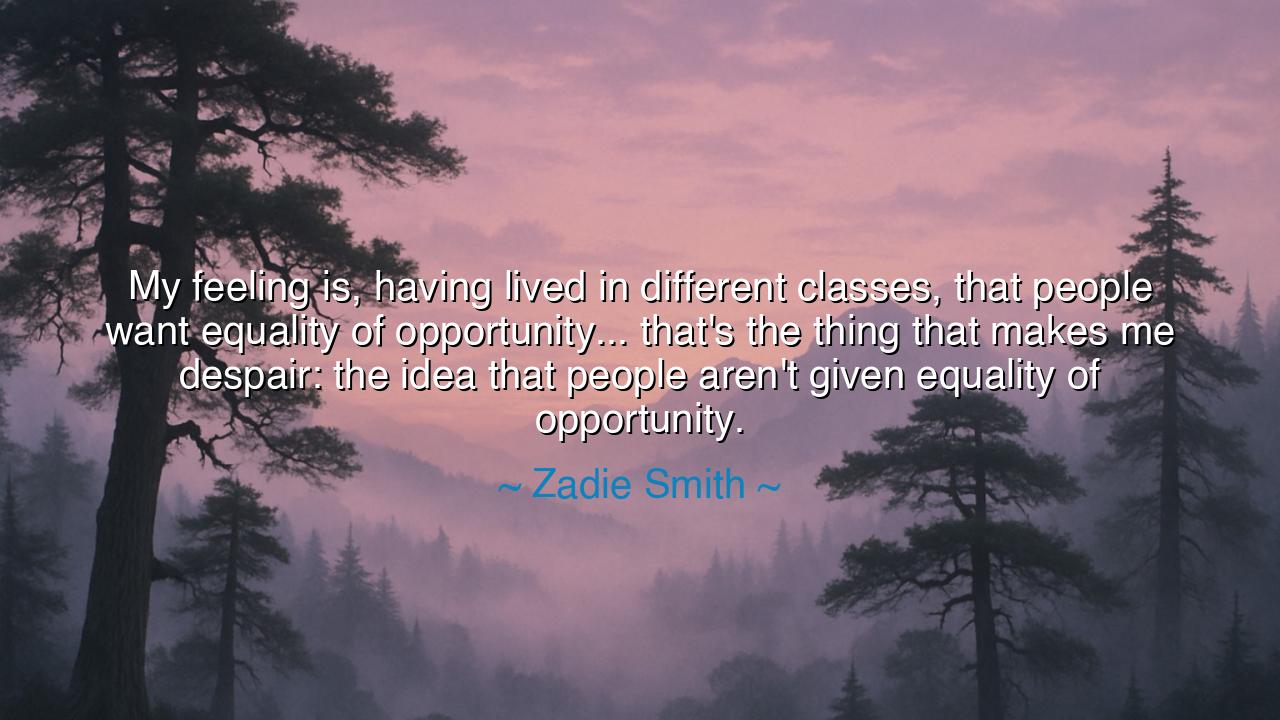
My feeling is, having lived in different classes, that people
My feeling is, having lived in different classes, that people want equality of opportunity... that's the thing that makes me despair: the idea that people aren't given equality of opportunity.






When Zadie Smith said, “My feeling is, having lived in different classes, that people want equality of opportunity... that's the thing that makes me despair: the idea that people aren't given equality of opportunity,” she spoke as both witness and philosopher. Her words carry the weight of one who has walked among worlds—from the working-class streets of her youth to the luminous halls of literary acclaim. This quote is not merely about economics; it is about the soul of justice. For Smith touches the eternal truth that the desire of humankind is not for sameness, but for fairness—that every person might begin life with an open path, unblocked by the accidents of birth or wealth.
From the earliest ages, societies have been marked by walls—some visible, some unseen. The pharaohs ruled while slaves toiled; lords feasted while peasants starved; nobles inherited while the poor prayed for mercy. Yet even in those times, the whisper of equality of opportunity stirred within the human spirit. The ancients understood that when a man or woman can rise through virtue, skill, and effort, civilization flourishes. But when birth becomes destiny, when the gates of success are barred to the worthy, then rot enters the heart of the nation. Smith’s despair, then, is not anger—it is sorrow for a world that forgets this timeless wisdom.
She speaks from the vantage of experience. Having grown up in a modest London household, the daughter of a Jamaican mother and an English father, Smith has known both the weight of exclusion and the privilege of acceptance. Her journey mirrors that of countless others who have crossed the boundaries of class—discovering that the walls are not only built of money, but of perception, prejudice, and fear. She has seen that while talent may be universal, opportunity is not, and therein lies the tragedy. For how many great minds are lost to hunger, how many voices silenced by poverty, how many dreams crushed by the indifference of the powerful?
Consider the story of Abraham Lincoln, born in a one-room cabin, self-taught by the dim light of a fire. He rose not because he was born to privilege, but because his nation—imperfect though it was—still left a narrow road open for a mind like his to climb. It was this freedom that allowed him to change the course of history. Yet imagine if he had been born into a place or time where education was forbidden to the poor. The world might have lost the wisdom of the man who freed millions. In this, we see what Smith means: without equality of opportunity, the world loses its potential, and humanity dims its own light.
Equality of opportunity is not equality of result. The wise know that not all will reach the same heights. But what wounds the spirit is not failure—it is futility. To labor with no chance of rising, to dream with no door to open—this is despair. And when a society allows such despair to spread, it erodes the foundation of hope itself. The ancients called this injustice by another name: hubris, the arrogance of those who forget that fortune is fickle and that the wheel of destiny turns for all.
Zadie Smith’s lament is also a warning. When nations neglect fairness, when education, housing, and justice become luxuries, they create a divided humanity—one that devours itself. Yet she does not call for envy or resentment, but for balance—for a world where every child, no matter where they are born, has the tools to forge their own path. It is not charity she seeks, but dignity: the right of every human being to test the limits of their own potential.
Let this truth be carried forward: equality of opportunity is the seed from which freedom grows. To the rulers and teachers, the artists and builders, the message is clear—remove the stones from the path of the next traveler. Create spaces where talent can breathe and courage can be rewarded. For no civilization can endure on inheritance alone; it must renew itself with each generation of dreamers who rise from the dust.
So remember this, O listener: justice begins not in the courts, but in the classroom; not in the throne, but in the heart. When we open the gates of opportunity to all, we honor the divine spark within humanity itself. And when we close them, we betray it. Zadie Smith’s despair is a mirror—but within it, if we look closely, we may yet see our redemption.






AAdministratorAdministrator
Welcome, honored guests. Please leave a comment, we will respond soon